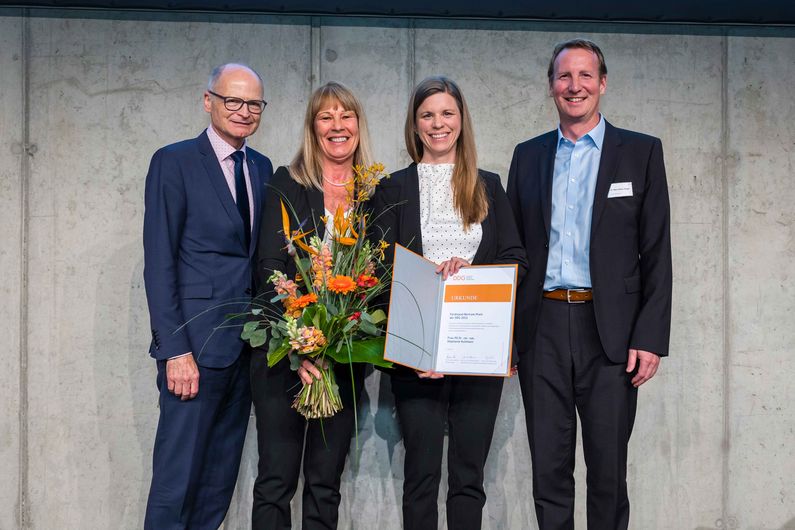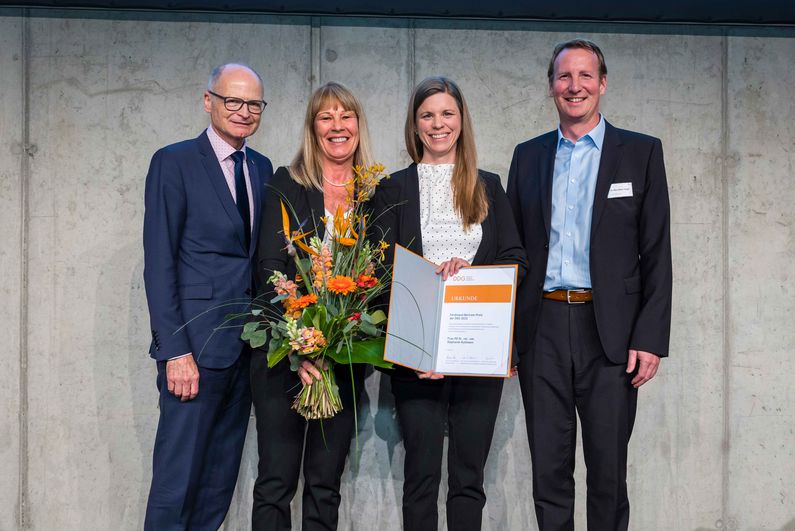Berlin/Tübingen, 31.05.2022
Stephanie Kullmann Awarded with the Ferdinand Bertram Prize
This year, the German Diabetes Association has awarded the Ferdinand Bertram Prize to Dr. Stephanie Kullmann, research group leader and deputy head of the department "Metabolic Neuroimaging" at the Institute of Diabetes Research and Metabolic Diseases (IDM) of Helmholtz Munich at the University of Tübingen. She received the prize for her work on "The role of central nervous processes in the prevention and treatment of type 2 diabetes mellitus".
Stephanie Kullmann studied biology at Lee University, Cleveland, Tennessee/USA and received her Bachelor of Science degree there in 2005. Subsequently, she entered the master's program "Neuro- and Behavioral Sciences" at the International Max Planck Research School at the University of Tübingen. She successfully completed the program in 2009 with her master's thesis "Neural correlates of prospective memory". She then conducted research as a doctoral student at the Institute of Medical Psychology and Behavioral Neurobiology at the University of Tübingen. In 2013, she received her doctorate in neuroscience there. Her dissertation on "The 'weighty' brain: the impact of body weight on the functional brain network" was awarded the distinction summa cum laude. In 2014, she was appointed deputy head of the "Metabolic Neuroimaging" department at the IDM/Helmholtz Zentrum München at the University of Tübingen, where she has headed a research group since 2019. From 2016 to 2018, Stephanie Kullmann participated in the postdoctoral fellowship program (PFP) of Helmholtz Zentrum München. In 2019, she completed her habilitation at the Medical Faculty of the University of Tübingen with the thesis "The Hypothalamic-Prefrontal Network in Prediabetes". Since 2020, Stephanie Kullmann has been a member of the study committees of the Graduate Training Centre of Neuroscience of the International Max Planck Research School at the University of Tübingen.
Kullmann’s scientific focus is in particular the role of central nervous processes in the prevention and treatment of type 2 diabetes mellitus. In recent years, she and her research group have shown that the effect of insulin in the human brain plays an important role in peripheral metabolism and eating behavior. Her current research projects deal in particular with the question of whether and how the insulin sensitivity of the brain can be improved. Initial study results show that insulin resistance in the brain can be treated with positive effects on the metabolism of the entire body.
The Ferdinand Bertram Prize, endowed with 20,000 euros, has been awarded since 1963 in honor of the diabetologist Ferdinand Bertram, who died in 1960, and is donated by Roche Diabetes Care Deutschland GmbH.

Fr.l.: Prof. Andreas Neu (DDG president), Prof. Annette Schürmann, PD Dr. Stephanie Kullmann, Dr. Marc Oliver Hergel (Roche Diabeets Care). © DDG/D.M.Deckbar
Founded in 1805, Tübingen University Hospital is one of the leading centers of German university medicine. As one of the 33 university hospitals in Germany, it contributes to the successful combination of high-performance medicine, research and teaching. Well over 400,000 inpatients and outpatients from all over the world benefit annually from this combination of science and practice. The clinics, institutes and centers unite all specialists under one roof. The experts work together across disciplines and offer each patient the best possible treatment based on the latest research findings. Tübingen University Hospital conducts research for better diagnoses, therapies and healing chances; many new treatment methods are clinically tested and applied here. In addition to diabetology, neuroscience, oncology, immunology, infection research and vascular medicine are research priorities in Tübingen. The Department of Diabetology /Endocrinology has been the center of interdisciplinary research over the past 25 years, especially with the participation of surgery, radiology and laboratory medicine. This important discovery of the prediabetes subtypes was only possible due to the interdisciplinary collaboration between the hospital’s various departments. Tübingen University Hospital is a reliable partner in four of the six German Centers for Health Research initiated by the German Federal Government. www.medizin.uni-tuebingen.de
Press contact

Birgit Niesing
niesing(at)dzd-ev.de
+49 (0)89 3187-3971
 |
